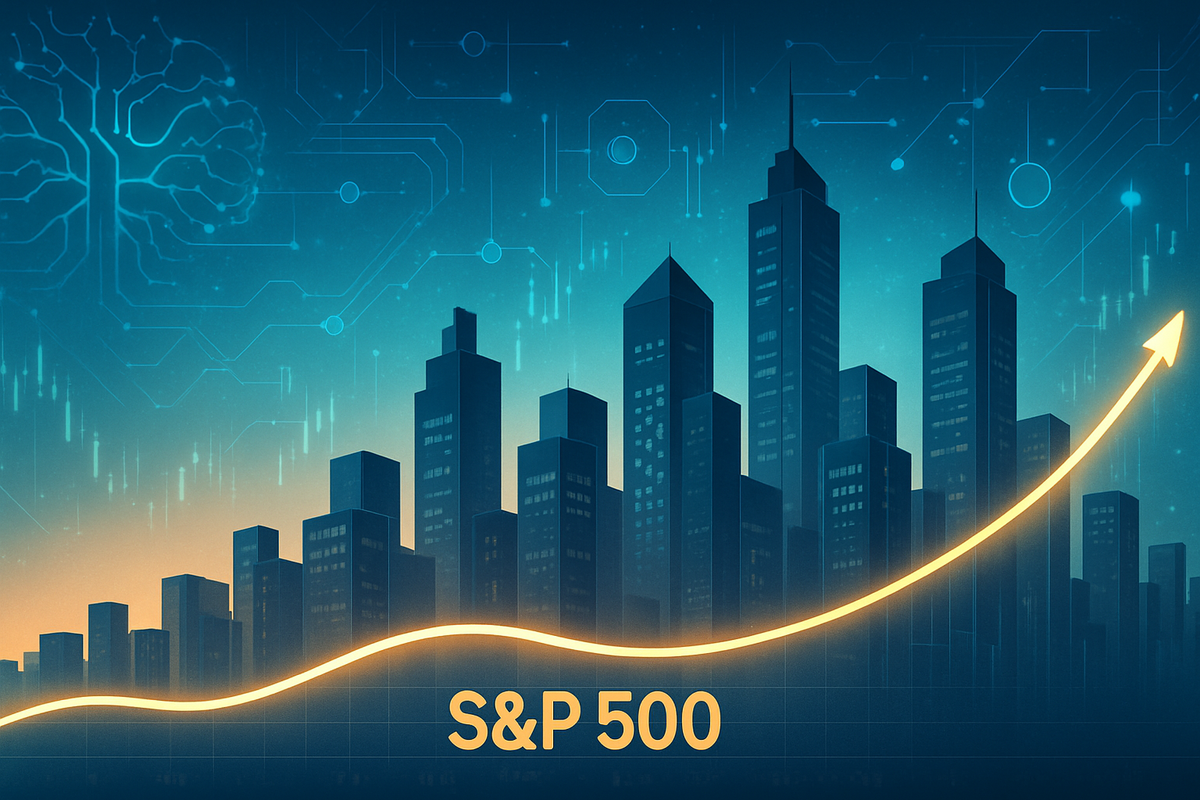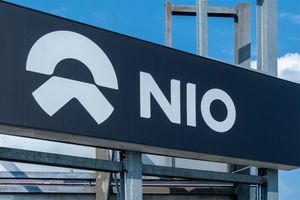
The technology sector remains the undisputed engine of global financial markets, relentlessly driving the S&P 500 to unprecedented valuations. Fueled by a wave of groundbreaking innovation, particularly in Artificial Intelligence (AI), the sector's robust growth and exceptional earnings are not only bolstering its own fortunes but also underpinning the broader market's resilience. This continued dominance underscores a fundamental shift in economic drivers, where digital transformation and intelligent technologies are dictating market direction and investor sentiment.
The immediate implications are clear: the market's trajectory is inextricably linked to the performance of a select group of tech giants. Their ability to innovate, generate substantial revenue, and deliver impressive earnings is masking potential weaknesses in other sectors, creating a concentrated yet powerful force that continues to reshape the investment landscape and challenge traditional valuation models.
The AI Juggernaut: How Innovation is Reshaping Market Dynamics
The current market cycle is profoundly defined by the technological sector's overwhelming influence. Specifically, the Information Technology segment now commands approximately one-third of the S&P 500's total market capitalization. When considering tech-adjacent behemoths within the Communication Services and Consumer Discretionary sectors—companies like Amazon (NASDAQ: AMZN), Alphabet (NASDAQ: GOOGL), Meta Platforms (NASDAQ: META), and Tesla (NASDAQ: TSLA)—this tech-focused portion can swell to nearly 50% of the index. This concentration highlights a crucial dynamic: the performance of a handful of mega-cap tech stocks, frequently referred to as the "Magnificent Seven" (Apple (NASDAQ: AAPL), Amazon (NASDAQ: AMZN), Alphabet (NASDAQ: GOOGL), Microsoft (NASDAQ: MSFT), Meta Platforms (NASDAQ: META), Nvidia (NASDAQ: NVDA), and Tesla (NASDAQ: TSLA)), is disproportionately responsible for the S&P 500's gains. In 2024 alone, these companies contributed nearly 60% of the index's total returns, their combined market capitalization representing 30% to 35% of the S&P 500.
At the heart of this surge is the Artificial Intelligence revolution. AI stands as the paramount innovation propelling the technology sector's current growth and its far-reaching impact on the market. Companies like Nvidia (NASDAQ: NVDA) have experienced explosive growth due to their near-monopoly in data center GPUs, essential infrastructure for AI. Other tech titans such as Microsoft (NASDAQ: MSFT), Alphabet (NASDAQ: GOOGL), and Meta Platforms (NASDAQ: META) are heavily invested in developing and integrating large language models and advanced AI tools across their product ecosystems.
The economic value creation from AI is projected to be immense. Morgan Stanley estimates that the full integration of AI across S&P 500 companies could generate an annual net benefit of approximately $920 billion. In the long term, this could translate into a staggering $13 trillion to $16 trillion increase in the S&P 500's market capitalization, encompassing contributions from "agentic AI" (autonomous planning and task execution) and "embodied AI" (like humanoid robots). The influence of AI extends far beyond traditional tech, permeating various industries, including manufacturing and broader business infrastructure, as companies race to leverage AI for enhanced productivity and efficiency.
The sector's robust performance is fundamentally supported by exceptional earnings growth. The "Magnificent Seven" companies alone demonstrated impressive earnings growth of 36% in 2023 and an anticipated 33% in 2024, significantly outpacing the rest of the S&P 500. The S&P 500 Information Technology sector's earnings per share saw a notable year-over-year increase of nearly 29% by June 2025, and is expected to show an 11.9% increase in Q3 2025, compared to a projected 5.1% for the overall S&P 500. Without the tech sector's contribution, the S&P 500's earnings growth would shrink to a mere 2.0%. This strong financial performance, coupled with investor enthusiasm buoyed by expectations of Federal Reserve interest rate cuts, which typically favor growth-oriented assets, has repeatedly propelled the S&P 500 to new record highs throughout 2024 and 2025.
Winners and Losers in the AI-Driven Market
The burgeoning AI revolution and the tech sector's continued market dominance have created a clear stratification of winners and losers across the economic landscape. Companies at the forefront of AI development, infrastructure, and integration are experiencing unprecedented growth, while those unable to adapt or whose business models are directly challenged by AI face significant headwinds.
Leading the charge among the winners are the foundational builders of the AI infrastructure. Nvidia (NASDAQ: NVDA) stands as the undisputed champion, with its GPUs (Graphics Processing Units) being indispensable for training and operating AI models. The company’s CUDA software ecosystem further entrenches its leadership, reporting record Q2 revenue of $46.7 billion, a 56% year-over-year increase, and reaching a staggering market capitalization of $4.14 trillion. Hyperscale cloud providers like Microsoft (NASDAQ: MSFT) with Azure, Amazon (NASDAQ: AMZN) with AWS, and Alphabet (NASDAQ: GOOGL) with Google Cloud are also solidifying their dominance. These giants are projected to invest over $300 billion in AI infrastructure in 2025, integrating AI across their product suites and benefiting from the massive computational demands placed on their platforms. Microsoft, for instance, leverages AI in Microsoft 365 Copilot, while Amazon utilizes AI for enhanced product listings, recommendations, and supply chain optimization. Alphabet harnesses AI for its core search, advertising, and advanced models like Gemini. Other direct tech players, such as AMD (NASDAQ: AMD) in the semiconductor space and Meta Platforms (NASDAQ: META) embedding AI into its social media products, are also significant beneficiaries. AI-focused software firms like Salesforce (NYSE: CRM) are integrating AI into enterprise CRM platforms to drive efficiency and decision-making, leading to rallies in the software sector.
Beyond direct tech, several industries are becoming "AI practitioners" and reaping rewards. The utility sector, exemplified by companies like Hawaiian Electric Industries, Inc. (NYSE: HE), stands to benefit from the insatiable demand for power from AI data centers, which is projected to increase power prices. Financial services firms, including JPMorgan Chase (NYSE: JPM), are deploying AI for fraud detection, customer service, and market analysis. Upstart (NASDAQ: UPST) is disrupting traditional credit scoring with an AI-based model, while Kemper (NYSE: KMPR) uses AI to enhance underwriting, claims processing, and fraud detection. Automotive innovators like Tesla (NASDAQ: TSLA) are heavily investing in AI for their full self-driving technology. Even industrial businesses such as Vertiv (NYSE: VRT), which supplies essential infrastructure for AI data centers, and Siemens, making factories smarter with AI, are seeing significant gains in efficiency and reductions in energy use. IT services providers like Science Applications International Corporation (NASDAQ: SAIC) are also benefiting from increased demand for AI integration solutions.
Conversely, companies struggling to adapt to the rapid technological shift are finding themselves on the losing end. Legacy tech firms, such as Intel (NASDAQ: INTC) and Dell (NYSE: DELL), have been slower to integrate AI into their core strategies, leading to an erosion of market share compared to more agile, AI-focused rivals. Traditional software and IT services firms, outside the immediate AI boom, are also finding it difficult to maintain momentum. Companies like Asana (NYSE: ASAN) have reduced forecasts, citing a shift in customer investment towards AI solutions away from traditional tech. Even dominant cloud providers like AWS are showing signs of competitive pressure from sovereign cloud players and startups.
Perhaps the most dramatic examples of "losers" come from industries whose expertise-based business models are directly challenged by AI. Chegg Inc. (NYSE: CHGG), an educational assistance provider, saw its core proposition undermined by AI tools like ChatGPT, leading to a significant drop in its share price. Similarly, Gartner (NYSE: IT), a global leader in research and advisory services, experienced a nearly 28% single-day stock plunge, losing about half its market value since early 2025, as clients increasingly turn to AI chatbots for insights instead of traditional expert advice, causing a significant deceleration in its total contract value growth. Industries reliant on traditional labor models or large headcounts are also vulnerable, as AI automates knowledge-based work. Smaller, undercapitalized firms face immense pressure, as the heavy investment required for AI integration, coupled with increased borrowing costs, makes it difficult for them to keep pace with larger, well-funded competitors.
Industry Impact and Broader Implications
The technology sector's market dominance, supercharged by the AI revolution, represents a profound and multifaceted transformation spanning global industries, economies, and societies. This era is characterized by an unprecedented pace of innovation, widespread adoption, and a significant re-calibration of economic and political power, fitting into broader trends of optimization, ubiquitous integration, and data-driven decision-making across nearly every sector.
AI is proving to be a general-purpose technology (GPT), much like electricity or the internet, with its influence extending far beyond traditional tech. In healthcare, it's revolutionizing early diagnosis and personalized treatment. Agriculture leverages AI for optimized crop yields, while manufacturing benefits from AI-driven automation for increased output and predictive maintenance. Finance is being transformed by AI's capabilities in portfolio optimization, risk management, and fraud detection, while retail uses AI for personalized recommendations and efficient inventory management. The tech sector, propelled by AI, has thus evolved into critical infrastructure, underpinning virtually every aspect of economic activity and accelerating global digitalization. This pervasive influence means that even industries historically separate from tech are now being fundamentally reshaped by its advancements.
The ripple effects on competitors and partners are already significant, creating distinct winners and losers and fostering new partnership models. AI innovators and infrastructure providers, particularly semiconductor giants like Nvidia (NASDAQ: NVDA) and cloud service providers, are commanding premium valuations. Nvidia's more than 80% market share in AI training GPUs and its CUDA software platform create a strong "lock-in" effect for developers. Early adopters across industries are gaining substantial competitive advantages. However, established incumbents that fail to rapidly adapt risk obsolescence, a modern iteration of the "Innovator's Dilemma." Smaller businesses often struggle to compete with the vast data and platform advantages of Big Tech. The rise of new AI players, such as OpenAI, is also casting a shadow over the established dominance of companies like Alphabet (NASDAQ: GOOGL) in areas like search, driving new competitive dynamics. Strategic partnerships are also becoming crucial, exemplified by Oracle's (NYSE: ORCL) growth in cloud services fueled by collaborations with Amazon Web Services, Google Cloud, and Microsoft Azure (NASDAQ: MSFT) to support AI expansion, and Microsoft's substantial investment in OpenAI.
The expanding power of Big Tech and rapid AI advancements have intensified regulatory scrutiny worldwide. Concerns about antitrust and market concentration are paramount, with new merger guidelines in 2025 lowering thresholds for "highly concentrated" markets, increasing scrutiny on acquisitions of AI startups. Regulators aim to balance fostering innovation with preventing monopolistic practices. Ethical AI and accountability are also major concerns, with demands for clear rules addressing algorithmic bias, privacy violations, and the potential erosion of human autonomy. Transparency and explainability in AI algorithms are deemed essential. Policymakers are also grappling with socio-economic impacts, including potential job market polarization and the need for workforce reskilling. Historically, the AI revolution is frequently compared to the Industrial Revolution and the internet's transformative effect, with both paving the way for entirely new industries. While some liken the current AI exuberance to the dot-com bubble, many analysts argue the AI boom is more fundamentally robust, driven by tangible earnings and deep integration into critical workflows. Nevertheless, the concentration of market power in a few tech behemoths draws comparisons to the "modern-day robber barons" of the Industrial Gilded Age, underscoring the urgency for proactive antitrust measures to prevent similar outcomes as seen in the Web 2.0 era.
What Comes Next
The ongoing dominance of the technology sector, fueled by the relentless march of AI, presents a dynamic and evolving landscape with both transformative potential and significant challenges. The coming years will demand strategic pivots, continuous adaptation, and a keen eye on emerging opportunities and regulatory shifts.
In the short term (1-3 years), AI's integration into core business operations will deepen, primarily focused on enhancing efficiency, automating repetitive tasks, and refining decision-making. A staggering 85% of businesses plan to increase their AI spending within the next 12 months, benefiting core technology and semiconductor sectors immensely, as advanced chips and scalable cloud infrastructure become indispensable. The "Magnificent Seven" tech giants (Nvidia (NASDAQ: NVDA), Microsoft (NASDAQ: MSFT), Alphabet (NASDAQ: GOOGL), Amazon (NASDAQ: AMZN), Meta Platforms (NASDAQ: META), Apple (NASDAQ: AAPL), and Tesla (NASDAQ: TSLA)) are expected to maintain their market dominance, their strategic moves continuing to dictate sector-wide trends. The focus will be on tangible AI applications and measurable returns on investment.
Looking further ahead (beyond 3 years), the global AI market is projected for explosive, exponential growth, potentially quadrupling its share of the global frontier technology market by 2033 to reach $4.8 trillion. This expansion will be fueled by continuous advancements in computational power, increasing data availability, and the widespread embrace of AI solutions by enterprises. AI is predicted to contribute trillions to the global economy through unprecedented efficiency, radical cost-cutting, and the creation of entirely new revenue streams, with generative AI alone potentially delivering between $2.6 trillion and $4.4 trillion in economic benefits annually. The market's focus will evolve from speculative growth narratives to a demand for demonstrated profitability and scalable AI applications beyond current tech leaders, broadening AI's benefits to include traditional industries and even small-cap companies.
To navigate this landscape, strategic pivots are crucial. Companies must view AI as a strategic imperative, integrating it into every facet of their product portfolios and internal operations. This necessitates rethinking workforce skills, redesigning job roles, emphasizing AI training, and fostering continuous learning. Investing in AI infrastructure—advanced chips, cloud computing, and massive data centers—is paramount. Some tech giants, like Microsoft (NASDAQ: MSFT), are even exploring strategic pivots into nuclear energy to secure reliable, carbon-free electricity for their expanding AI operations. Developing proprietary AI capabilities and navigating complex regulatory and ethical considerations will also be vital for maintaining a competitive edge and building trust. Market opportunities abound in AI infrastructure, software and services, and industry-specific applications across finance, healthcare, manufacturing, and logistics. New revenue streams and productivity gains will be key drivers. However, challenges persist, including the high costs and complexity of AI implementation, regulatory scrutiny and ethical concerns (e.g., data privacy, algorithmic bias), potential job displacement, security risks, and the increasing market concentration. Geopolitical tensions surrounding AI dominance also present significant headwinds. The future will likely see scenarios ranging from optimistic growth with widespread AI adoption and hybrid human-AI collaboration, to more volatile cycles with market consolidation, regulatory catch-up struggles, and ethical challenges if not carefully managed.
Conclusion
The technology sector's unprecedented market dominance, powered by the AI revolution, is not merely a passing trend but a fundamental, enduring shift that is redefining industries, investment strategies, and the global economic landscape. This transformative period is characterized by relentless innovation, significant market growth, and a fundamental recalibration of value across various segments.
Key takeaways highlight AI as a foundational driver of economic transformation, catalyzing substantial market growth within technology and semiconductor sectors. It is redefining efficiency in financial operations, risk management, and trading, with AI-driven algorithmic trading now dominating significant market volumes. AI's influence extends far beyond efficiency, accelerating existing trends toward digitalization and data-driven decision-making across virtually all industries. Advancements in Machine Learning, Deep Learning, Natural Language Processing, Image Processing, and Speech Recognition contribute to its widespread applicability. Generative AI alone is projected to deliver between $2.6 trillion and $4.4 trillion in economic benefits annually, potentially contributing $15.7 trillion to the global economy by 2030, with organizations already reporting 20% to 30% productivity gains. The rapid adoption rate, with 78% of companies globally using AI in at least one business function in 2024, underscores its status as a strategic imperative for enhanced productivity, innovation, and decision-making.
Moving forward, the global AI market is projected for exponential growth, solidifying its position as the dominant frontier technology, estimated to reach $1.1 trillion by 2029 and potentially $4.8 trillion by 2033. The market's focus will evolve from speculative growth narratives to a demand for demonstrated profitability and scalable AI applications, broadening its benefits beyond the "Magnificent Seven" to include traditional industries and small-cap companies. However, concerns about market concentration, potential "bubble" dynamics in AI-related stocks, ethical considerations, job displacement, data privacy, and algorithmic bias remain significant challenges that necessitate robust governance and compliance. The AI revolution is a defining technological shift of our time, poised to become a general-purpose technology beyond 2030, increasing global productivity by as much as 40%. While AI could affect 40% of jobs globally, with up to one-third in advanced economies at risk of automation, approximately 27% of jobs in these economies could be enhanced by AI, boosting productivity and complementing human skills.
For investors, a strategic and discerning approach is paramount in the coming months. It is crucial to shift focus towards companies that can demonstrate clear pathways from AI investment to tangible revenue growth and sustainable business models. Diversifying exposure across the entire AI value chain, including foundational infrastructure providers (semiconductor companies like Nvidia (NASDAQ: NVDA)), cloud service providers, and software developers integrating AI, is advisable. Investors should watch for companies successfully developing and integrating scalable AI applications and agentic AI, as these could become increasingly entrenched. Assessing companies' "AI-ready data" capabilities will also be vital. To mitigate risks, consider investing in companies that are strong performers independently but also benefit significantly from AI integration. Monitoring regulatory developments and ethical frameworks is essential, as new regulations and compliance costs could impact businesses, while companies with strong, transparent AI governance frameworks may prove more resilient. Finally, leveraging AI-powered tools for enhanced research and market analysis can provide a valuable edge in this rapidly evolving landscape. The tech sector's dominance, fueled by AI, is undeniably driving significant shifts; while immense opportunities exist, vigilance against market concentration, potential volatility, and the evolving regulatory landscape will be key to successful navigation.





